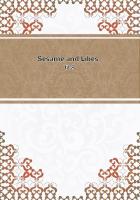Calamities such as these would assuredly have been treated as warnings sent from on high, both in earlier times, when a Church better braced for the due performance of its never-ending task, eagerly interpreted to awful ears the signs of the wrath of God, and by a later generation, leavened in spirit by the self-searching morality of Puritanism. But from the sorely-tried third quarter of the fourteenth century the solitary voice of Langland cries, as the voice of Conscience preaching with her cross, that "these pestilences" are the penalty of sin and of naught else. It is assuredly presumptuous for one generation, without the fullest proof, to accuse another of thoughtlessness or heartlessness; and though the classes for which Chaucer mainly wrote and with which he mainly felt, were in all probability as little inclined to improve the occasions of the Black Death as the middle classes of the present day would be to fall on their knees after a season of commercial ruin, yet signs are not wanting that in the later years of the fourteenth century words of admonition came to be not unfrequently spoken. The portents of the eventful year 1382 called forth moralisings in English verse, and the pestilence of 1391 a rhymed lamentation in Latin; and at different dates in King Richard's reign the poet Gower, Chaucer's contemporary and friend, inveighed both in Latin and in English, from his conservative point of view, against the corruption and sinfulness of society at large. But by this time the great peasant insurrection had added its warning, to which it was impossible to remain deaf.
A self-confident nation, however, is slow to betake itself to sackcloth and ashes. On the whole it is clear, that though the last years of Edward III were a season of failure and disappointment,--though from the period of the First Pestilence onwards the signs increase of the king's unpopularity and of the people's discontent,--yet the overburdened and enfeebled nation was brought almost as slowly as the King himself to renounce the proud position of a conquering power. In 1363 he had celebrated the completion of his fiftieth year; and three suppliant kings had at that time been gathered as satellites round the sun of his success.
By 1371 he had lost all his allies, and nearly all the conquests gained by himself and the valiant Prince of Wales; and during the years remaining to him his subjects hated his rule and angrily assailed his favourites. From being a conquering power the English monarchy was fast sinking into an island which found it difficult to defend its own shores. There were times towards the close of Edward's and early in his successor's reign when matters would have gone hard with English traders, naturally desirous of having their money's worth for their subsidy of tonnage and poundage, and anxious, like their type the "Merchant" in Chaucer, that "the sea were kept for anything" between Middelburgh and Harwich, had not some of them, such as the Londoner John Philpot, occasionally armed and manned a squadron of ships on their own account, in defiance of red tape and its censures. But in the days when Chaucer and the generation with which he grew up were young, the ardour of foreign conquest had not yet died out in the land, and clergy and laity cheerfully co-operated in bearing the burdens which military glory has at all times brought with it for a civilised people. The high spirit of the English nation, at a time when the decline in its fortunes was already near at hand (1366), is evident from the answer given to the application from Rome for the arrears of thirty-three years of the tribute promised by King John, or rather from what must unmistakeably have been the drift of that answer. Its terms are unknown, but the demand was never afterwards repeated.
The power of England in the period of an ascendancy to which she so tenaciously sought to cling, had not been based only upon the valour of her arms. Our country was already a rich one in comparison with most others in Europe. Other purposes besides that of providing good cheer for a robust generation were served by the wealth of her great landed proprietors, and of the "worthy vavasours" (smaller landowners) who, like Chaucer's "Franklin"--a very Saint Julian or pattern of hospitality--knew not what it was to be "without baked meat in the house," where their tables dormant in the hall alway Stood ready covered all the longe day.
>From this source, and from the well-filled coffers of the traders came the laity's share of the expenses of those foreign wars which did so much to consolidate national feeling in England. The foreign companies of merchants long contrived to retain the chief share of the banking business and export trade assigned to them by the short-sighted commercial policy of Edward III, and the weaving and fishing industries of Hanseatic and Flemish immigrants had established an almost unbearable competition in our own ports and towns. But the active import trade, which already connected England with both nearer and remoter parts of Christendom, must have been largely in native hands; and English chivalry, diplomacy, and literature followed in the lines of the trade-routes to the Baltic and the Mediterranean. Our mariners, like their type the "Shipman" in Chaucer (an anticipation of the "Venturer" of later days, with the pirate as yet, perhaps, more strongly marked in him than the patriot),--knew well all the havens, as they were >From Gothland, to the Cape of Finisterre, And every creek in Brittany and Spain.














